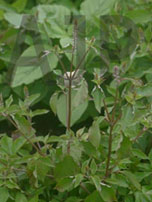SHAHEED KARTAR SINGH SARABHA AYURVEDIC MEDICAL COLLEGE & HOSPITAL
Affiliated to Guru Ravidas Ayurved University, Hoshiarpur Punjab
Affiliated to Guru Ravidas Ayurved University, Hoshiarpur Punjab

Botanical Name : Achyranthes aspera Linn
Family : Amaranthaceae
Introduction :
Apamarga used for preparing Kshara & removal of excessive water from our body
Names in different Indian languages :
English : Prickly Chaff Flower
Hindi : Circita
Kannada : Uttaren
Malayalam : Katalati, van Katalati;
Sanskrit : Apaamaarga
Tamil : Nayurvi
Telugu : Apamargu
Synonyms :
Chirchitaa, Shikhari, Shaikharika, Adahshalya, Mayura, Mayuraka, Kharamanjari, Kharapushpaa, Pratyakpushpaa, Aaghaat, Vashira, Kanihi.
Classification according to Charaka, Susrutha & Vagbhata :
Charaka: sirovirecanopaga, Kimighna, Vimanopaga
Susrutha: Arkãdi
Vagbhata: Arkãdi
Properties :
Rasa : Katu, Tikta
Guna : Laghu, Rüksa, Tiksna
Virya : Usna
Vipãka : Katu
Karma : Astringent, diuretic, hepatoprotective, emmenagogue
Indications :
Chardi, Hridroga, Adhmãna, Kandü, sula, Udara, Apaci, Raktaras, Visücikã, Krimi, Sidhma, Sadyo vrana, Mutrakrcchra
Anaemia, piles, fistula, menorrhagia
Part Used :
Whole plant
Dosage :
Leaf juice 10-15 ml
Powder 2-4 g
Decoction 50-100 ml
Morphology :
A stiff erect herb, 30-90 cm high. Branches spreading,
Leaves— dimple, opposite, velvety-tomentose, 3.8-12.5 cm x 5.1-7.6 cm.
Flowers— bisexual, greenish-white, arranged in long spikes, inverted (Hence Apamarga).
Flowering in winter and fruiting in summer.
Habitat & Distribution :
all over India
External uses :
Anti-inflammatory, analgesic, antidote, antiseptic, nasal decongestant. Crushed leaves are applied on inflammatory lesions, Its anjan is applied in opthalmic disorders, Juice of leaves )it is used in wounds. The leaves are crushed and applied on the area of scorpion stings. Oil processed in apamarga kshar is used in earache (otitis). A fine powder of seeds is used for pradhaman nasya (where this powder is blown through small tube into the nose). This reduces heaviness in the head instantly. The salts (kshars) are used in moles and fistula. Crushed seeds are applied locally in bleeding piles. The juice being haemostatic, stops bleeding from wounds.
Internal Use :
Digestive system : Carminative, appetizer, antacid and anthelmintic in nature. It is a good remedy for excessive appetite. It is used in emesis, loss of appetite, abdominal pain, indigestion, flatulence, ascites. piles, gall-stones. helminthiasis etc In excessive appetite. the seeds processed in milk and sugar are given as a food supplement This preparation takes time to digest but does not create any disorders. Thus, ii pacifies hunger as well. (It is believed that laddus prepared from seeds reduce appetite to such and extent that the person does not feel hungry for a couple of months.) Bhasmak is a disease where there is a voracious appetite The seeds cooked in nce (khichadi ) are given in bhasmak for one week. Apamarga khara is used in ascites.
Circulatory system : It is a blood purifier, it is also a haematinic and anti-inflammatory. It is used in anaemia, rheumatoid arthritis, oedema and scrofula. Apamarga kshara being alkaline is used in acid peptic disorders.
Respiratory system : The powder of roots is used in bronchitis and asthma as decongestant.
Urinary system : It is a diuretic and reduces acidic pH of urine. Kshar is used in renal calculi. cystitis and nephritis.
Skin : It is a diaphoretic and yet antipruritic. It is used in dermatoses, moles and other skin disorders. Mole falls oft when tied with kshar sutra of apamarga. It is also used in preparing ksharsutra for treating anal fistula.
Reproductive system : Apamarga has been used for punsavan vidhi (Vagbhatta Sharir 1/39). Punsavan vidhi is a procedure to beget an offspring of desired sex. Panchang of white apamarga is crushed and taken internally in pushya nakshatra. Apamrga roots are tied on abdomen for easy and safe delivery.
Important Yogas or Formations :
Apamarga ksãra taila, Sikhari grhta
